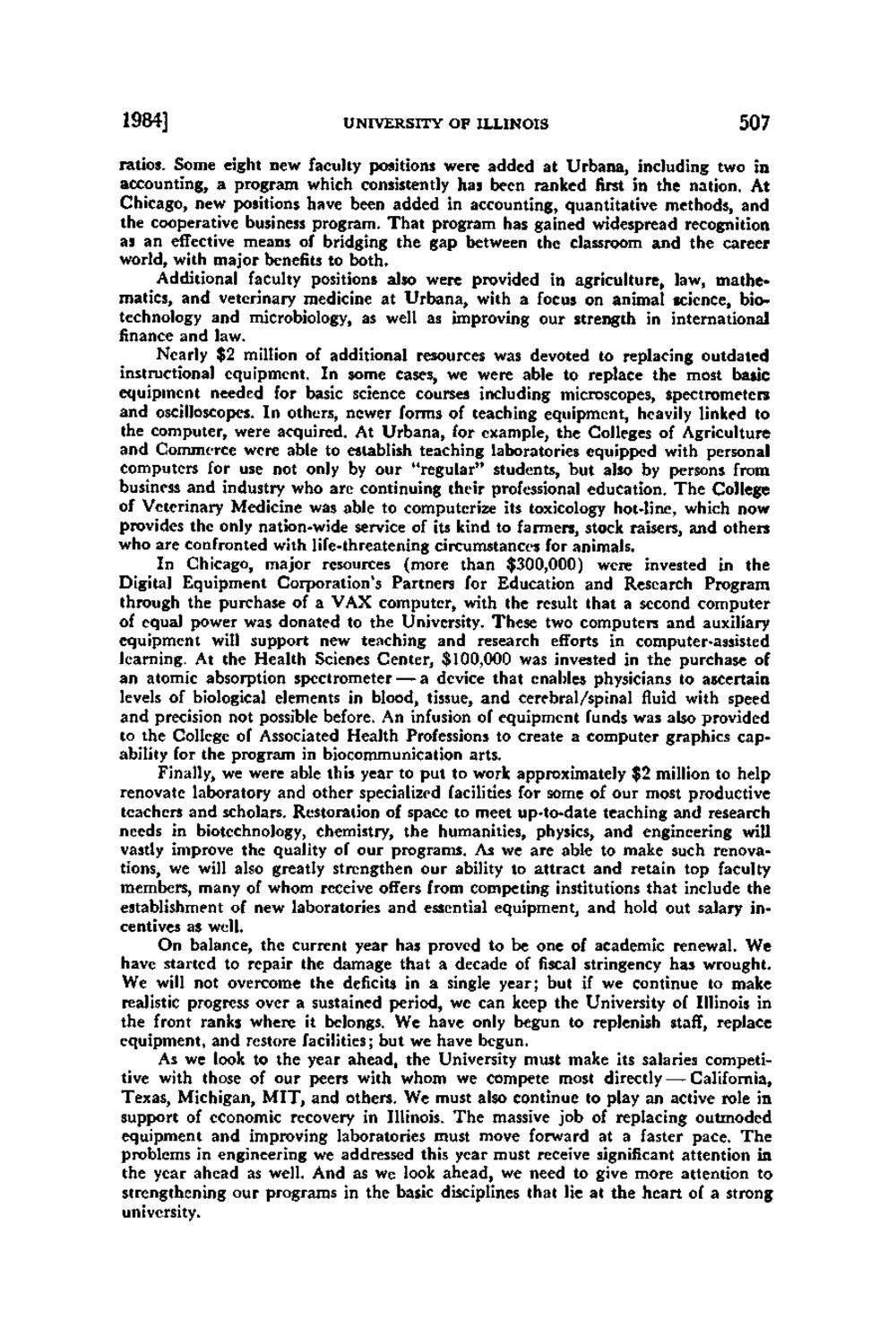| |
| |
Caption: Board of Trustees Minutes - 1984
This is a reduced-resolution page image for fast online browsing.

EXTRACTED TEXT FROM PAGE:
1984] UNIVERSITY OF ILLINOIS 507 ratios. Some eight new faculty positions were added at Urbana, including two in accounting, a program which consistently has been ranked first in the nation. At Chicago, new positions have been added in accounting, quantitative methods, and the cooperative business program. That program has gained widespread recognition as an effective means of bridging the gap between the classroom and the career world, with major benefits to both. Additional faculty positions also were provided in agriculture, law, mathematics, and veterinary medicine at Urbana, with a focus on animal science, biotechnology and microbiology, as well as improving our strength in international finance and law. Nearly $2 million of additional resources was devoted to replacing outdated instructional equipment. In some cases, we were able to replace the most basic equipment needed for basic science courses including microscopes, spectrometers and oscilloscopes. In others, newer forms of teaching equipment, heavily linked to the computer, were acquired. At Urbana, for example, the Colleges of Agriculture and Commerce were able to establish teaching laboratories equipped with personal computers for use not only by our "regular" students, but also by persons from business and industry who are continuing their professional education. The College of Veterinary Medicine was able to computerize its toxicology hot-line, which now provides the only nation-wide service of its kind to farmers, stock raisers, and others who are confronted with life-threatening circumstances for animals. In Chicago, major resources (more than $300,000) were invested in the Digital Equipment Corporation's Partners for Education and Research Program through the purchase of a VAX computer, with the result that a second computer of equal power was donated to the University. These two computers and auxiliary equipment will support new teaching and research efforts in computer-assisted learning. At the Health Scienes Center, $100,000 was invested in the purchase of an atomic absorption spectrometer — a device that enables physicians to ascertain levels of biological elements in blood, tissue, and cerebral/spinal fluid with speed and precision not possible before. An infusion of equipment funds was also provided to the College of Associated Health Professions to create a computer graphics capability for the program in biocommunication arts. Finally, we were able this year to put to work approximately $2 million to help renovate laboratory and other specialized facilities for some of our most productive teachers and scholars. Restoration of space to meet up-to-date teaching and research needs in biotechnology, chemistry, the humanities, physics, and engineering will vastly improve the quality of our programs. As we are able to make such renovations, we will also greatly strengthen our ability to attract and retain top faculty members, many of whom receive offers from competing institutions that include the establishment of new laboratories and essential equipment, and hold out salary incentives as well. On balance, the current year has proved to be one of academic renewal. We have started to repair the damage that a decade of fiscal stringency has wrought. We will not overcome the deficits in a single year; but if we continue to make realistic progress over a sustained period, we can keep the University of Illinois in the front ranks where it belongs. We have only begun to replenish staff, replace equipment, and restore facilities; but we have begun. As we look to the year ahead, the University must make its salaries competitive with those of our peers with whom we compete most directly — California, Texas, Michigan, MIT, and others. We must also continue to play an active role in support of economic recovery in Illinois. The massive job of replacing outmoded equipment and improving laboratories must move forward at a faster pace. The problems in engineering we addressed this year must receive significant attention in the year ahead as well. And as we look ahead, we need to give more attention to strengthening our programs in the basic disciplines that lie at the heart of a strong university.
| |